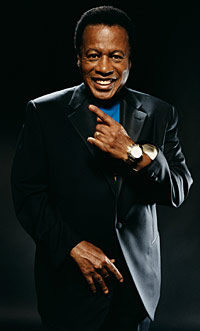Journey to the unknown
Composer and saxophonist Wayne Shorter on the essence of his music
| 15 October 2009
BERKELEY — For saxophonist and composer Wayne Shorter, making music is an opportunity to try to express what it means to be human. "I'm challenging myself to see if I can make a metaphor of life musically," says the 76-year-old composer, who prefers to think of himself as a "decomposer, someone who takes things apart."
 Wayne Shorter
Wayne Shorter When Shorter reassembles the pieces, he often incorporates classical, Latin, and modern music into his jazz landscapes. His compositions are economical yet are expansive and exhilarating.
Shorter and his acoustic quartet will perform at Zellerbach Hall this Saturday, Oct. 17, at 8 p.m. Their program will include popular and progressive jazz, with a healthy dose of Shorter's work. The New York Times called the quartet, which includes Danilo Pérez on piano, John Patitucci on bass, and Brian Blade on drums, "this century's sterling small jazz combo."
Shorter knows stellar jazz lineups. He got his start in 1959 with Art Blakey's Jazz Messengers and then in 1964 joined Miles Davis' second quintet. The roster included pianist Herbie Hancock, bassist Ron Carter, and drummer Tony Williams. He later formed the seminal jazz-fusion group Weather Report in 1970.
Shorter describes his current group's mission in cryptic terms: "There's a big door we're trying to push open. If we can push that door even wider than the pathway, a yellow brick road is there." Shorter says, "we gotta get off this cobblestone, off this path." Then "we can take the best things from the path like a flashlight and flash into the darkness of the unknown," says the mystical musician, speaking metaphorically. "That's what this group is about."
Illuminating the unknown requires dialogue to "get into the heart of the person who doesn't look like you, eat like you, walk like you. When we start to evolve, we're going to become more than identity, more human," says Shorter, a longtime Buddhist, who finds names and labels superficial and would like to see the world's people travel on a "compassionate road."
Shorter says there are "many dimensions in this wishful, galactic, gleaning journey" he wants to express through his art. At the same time, "music is not the ocean of life." It's "just a drop in the ocean of life, like baseball, medicine, and architecture."
The creative challenge is to make "something that doesn't grow oxidized and rot" or that says "I know everything." Musicians would be well-advised to avoid "all the comfort-zone stuff that you think will carry you to the bank." Playing it safe isn't in the composer's repertoire. Shorter, who is a cinephile, says it's his quartet's job to "make a movie every night we play, to express this thing: Let's fly. Let's play to everyone's Captain Marvel."
The Wayne Shorter Quintet performs on Saturday, Oct. 17, at 8 p.m. at Zellerbach Hall. Tickets, at $52, $40, and $28, are available at Zellerbach Hall ticket office, by phone at 642-9988, and at calperformances.org, and at the door.
Before the concert, Cal Performances will present a discussion of Shorter's contributions to jazz from 5 to 6:30 p.m. in Zellerbach Hall's lobby mezzanine with jazz-radio host Jesse "Chuy" Varela, pianist Danilo Pérez of the Wayne Shorter Quartet, and Mike Zilber of the JazzSchool.
For select performances, Cal Performances offers UC Berkeley student, faculty and staff, senior and community rush tickets. Rush tickets are announced three hours prior to a performance and are available in person only at the Ticket Office beginning one hour before the performance; quantities may be limited. Rush ticket sales are limited to one ticket per person; all sales are cash only. Rush ticket prices are $10 for UC Berkeley students; $15 for UC Berkeley faculty and staff (UC Berkeley ID required) and seniors age 65 or older; and $20 for all other community members. Information is available at (510) 642-9988, press 2 for the rush hotline, three hours prior to a performance only.

